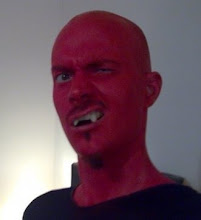Franklyn
Franklyn is an oddly constructed film. Firstly you have a strange faux gothic world of imposing architecture and shadows (a la Dark City) where religion has become mandatory by the state. The faith you have is less important than having one, and atheists are hunted down as terrorists by the state police/priests. Ryan Phillipe plays one such non-believing outlaw in a long coat and full mask get up with echoes of Watchmen’s Rorschach, though one with a capacity for violence that helps him stay one step ahead of the authorities. Aside from this you have a number of narratives taking place in present-day London; Bernard Hill is searching for his missing son, a soldier returned from war with whom he may have some past animosity; Eva Green is an art student whose art project involves filming suicide attempts and calling for an ambulance, which also may be a way of getting at her mother; Sam Riley is a drippy pretty boy who has just split up with his long-term girlfriend and proceeds to start hallucinating the existence of a childhood love.
As the film progresses these disparate strands intertwine until they all come together at the conclusion. The film retains the air of an independent production particularly in the London scenes which have a shooting style reminiscent of high-grade TV drama, though the religious dystopia sequences do have a genuine cinematic quality to them in both scale and cohesion of a well-crafted world. However this stylistic difference fragments the film a little and results in the melding of the different threads feel a little forced. The ‘real’ London scenes inevitably take place in back roads and sparsely populated buildings off the beaten track due to budget constraints, but a half-empty city lends these scenes a dreamlike quality at odds with the densely packed streets of the stylised faith nightmare.
The ‘twists’ in the story as the parts come together are more humdrum than they hint at individually and the film ultimately doesn’t convince, but the journey does at least try out more ideas than most films and is a fair distraction from mainstream by-the-numbers genre pieces.
Four Lions
To make a film about suicide bombers seems daring enough (although the Sri Lankan Terrorist was made in 1998 and released in the UK in May 2001) when most films about terrorism in this millennium take the pint of view of the West or a general overview of all involved, so to make a comedy about bumbling bombers seems insane, until you discover that the film is British, spiritual home of bumbling, and that it’s the debut feature from Chris Morris.
Anyone familiar with The Day Today and Brass Eye, not to mention the wealth of radio programmes, will know that taking on this subject is far from surprising (search for ‘Bomb Dogs’). That much of the comedy centres around the idiocy of the bombers themselves is perhaps most surprising. Though Morris has never shied away humour based on absurd dimness it contributes to a much higher proportion of laughs than any political/satirical digs or even the twisted wordplay he often favours (here mainly coming through via Riz Ahmed’s frustrated cursing in Urdu).
It is funny, provoking belly laughs throughout as the ridiculous nature of a horrible situation is highlighted, peppered with uneasy scenes of Riz Ahmed’s Omar at home with his wife and child, both of whom are loving and supportive of his dream of explosively martyring himself and others.
The cinematography shares more with TV than it does with cinema with the recurring establishing shots of the bomber’s hideout reminiscent of sitcom styling (perhaps intentional?) and Morris seems to be more comfortable experimenting when using different techniques, mixing CCTV and night vision footage in an echo of The Day Today. Unlike a TV show the film hangs together as one piece and earns a place as on of the better comedies of recent years, British or otherwise.


0 comments:
Post a Comment